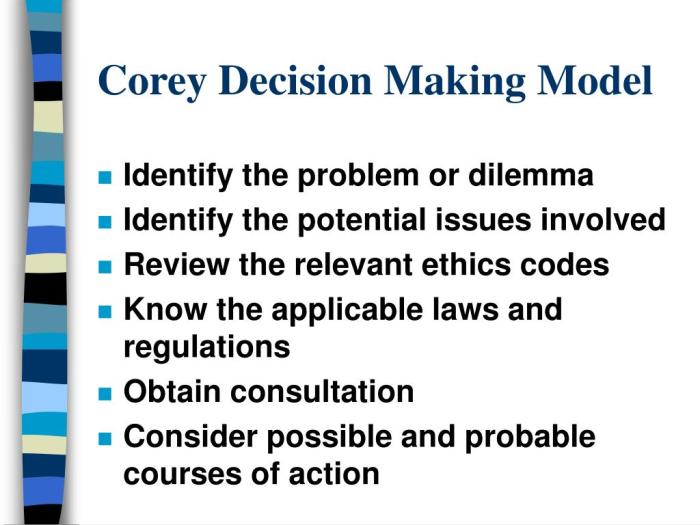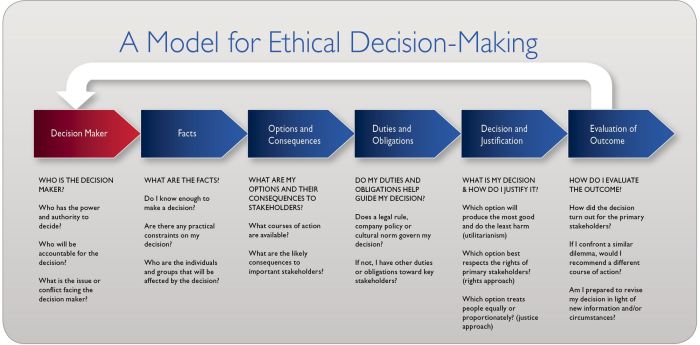Corey ethical decision making model – Corey’s Ethical Decision Making Model is a comprehensive framework that provides a systematic approach to ethical decision-making. It is grounded in ethical principles and values, and it incorporates personal values and professional ethics into the decision-making process. This model has been widely applied in various fields, including social work, healthcare, and education, and it has proven to be an effective tool for promoting ethical behavior and improving the quality of professional services.
The model consists of several key components, including ethical principles, process steps, and ethical reasoning skills. These components work together to guide individuals through the ethical decision-making process, from problem identification to implementation and evaluation. The model also fosters the development of essential ethical reasoning skills, such as critical thinking, problem-solving, and moral imagination.
1. Ethical Considerations

Corey’s Ethical Decision Making Model is grounded in ethical principles and values that guide the decision-making process. These principles include beneficence (doing good), non-maleficence (avoiding harm), autonomy (respecting the individual’s right to make their own decisions), and justice (fairness and equity).
Personal values and professional ethics play a significant role in ethical decision-making. Ethical decision-makers consider their own values and how they align with the ethical principles. They also consider the professional ethics of their field, which provide guidelines for ethical behavior in specific contexts.
2. Model Components: Corey Ethical Decision Making Model
Corey’s Ethical Decision Making Model consists of several key components:
- Ethical Principles:The ethical principles that guide the decision-making process (beneficence, non-maleficence, autonomy, and justice).
- Process Steps:The steps involved in the decision-making process (problem identification, gathering information, generating options, weighing the options, making a decision, implementing the decision, and evaluating the decision).
- Ethical Reasoning Skills:The skills necessary for ethical decision-making (critical thinking, problem-solving, communication, and empathy).
These components work together to guide ethical decision-making. The ethical principles provide the foundation for the decision-making process, while the process steps ensure a systematic and thorough approach. The ethical reasoning skills enable decision-makers to think critically, solve problems, communicate effectively, and empathize with others.
3. Decision-Making Process

Corey’s Ethical Decision Making Model involves the following steps:
- Problem Identification:Identifying the ethical issue or dilemma.
- Gathering Information:Collecting relevant information about the issue.
- Generating Options:Developing potential solutions to the issue.
- Weighing the Options:Evaluating the potential consequences of each option.
- Making a Decision:Choosing the best option based on the ethical principles and relevant information.
- Implementing the Decision:Putting the decision into action.
- Evaluating the Decision:Assessing the outcomes of the decision and making any necessary adjustments.
This step-by-step process ensures that ethical decisions are made in a thoughtful and deliberate manner.
Query Resolution
What are the key components of Corey’s Ethical Decision Making Model?
The key components of Corey’s Ethical Decision Making Model include ethical principles, process steps, and ethical reasoning skills.
How does Corey’s model foster the development of ethical reasoning skills?
Corey’s model fosters the development of ethical reasoning skills through its emphasis on critical thinking, problem-solving, and moral imagination.
What are some of the applications of Corey’s Ethical Decision Making Model?
Corey’s Ethical Decision Making Model has been applied in various fields, including social work, healthcare, and education.
What are some of the limitations of Corey’s Ethical Decision Making Model?
Some of the limitations of Corey’s Ethical Decision Making Model include its complexity and the potential for bias.